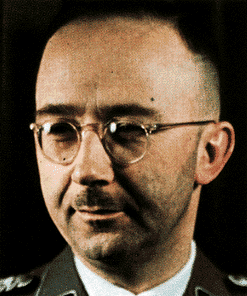Himmler's
Annotated Hitler Rare
'Mein Kampf' Donated to Museum
By
Jim Fitzgerald Associated Press
NEW
YORK -- Heinrich Himmler
was just 27 when he studied a copy of
Adolf Hitler's "Mein Kampf." The man
who would eventually order construction
of the Auschwitz concentration camp
evidently liked what he read. Himmler's
copy of "Mein Kampf" has been donated
to the Museum of Jewish Heritage, and
historians say his annotations reveal
the ideology that propelled him to the
head of the Nazi police.
 "It
shows that the doctrine of
antisemitism, nationalism and even how
to get rid of the Jews was already
being considered by Himmler as well as
Hitler in the 1920s," Manhattan
District Attorney Robert
Morgenthau, chairman of the
museum's board, said Friday.
"It
shows that the doctrine of
antisemitism, nationalism and even how
to get rid of the Jews was already
being considered by Himmler as well as
Hitler in the 1920s," Manhattan
District Attorney Robert
Morgenthau, chairman of the
museum's board, said Friday.
Himmler underlined a passage in
which Hitler writes that the gassing of
12,000 to 15,000 Jews might have saved
the lives of hundreds of thousands of
Germans in World War I, said Richard
Breitman, a Himmler biographer and
history professor at American
University in Washington. "He took the
racial ideology lock, stock and
barrel," Breitman said. "It's another
line of continuity in early Nazi
ideology to the policies of the Nazi
regime and eventually to the
Holocaust."
Himmler began reading the book, the
second volume of Hitler's manifesto, in
1927, the same year he was named deputy
leader of the secret police. Where
Hitler wrote that racial intermingling
was a threat to the "higher" race,
Himmler added in the margin, "The
possibility of de-miscegenation is at
hand."
"De-miscegenation presumably
involved eliminating the source of
racial intermingling," Breitman wrote
in a draft for an article to be
published in the academic journal
Holocaust and Genocide Studies.
The historian said scholars had been
unaware of the book's existence.
Morgenthau said the donor, a New
Yorker who wished to be anonymous,
found the book in his father's
possessions and offered it to the
year-old museum in Battery Park. "It'll
be displayed," he added. "It's part of
the story of the rise of Nazism."
